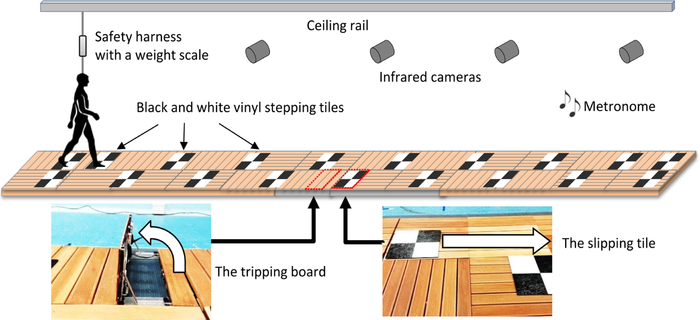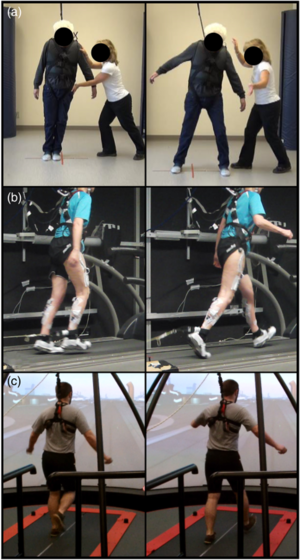Inoculation Against Falls: Balance Intervention Strategies
Original Editor - Selena Horner
Top Contributors - Selena Horner and Kim Jackson
Description[edit | edit source]
A special category of reactive balance intervention strategies is demonstrating value in reducing falls. Inoculation against falls uses the same principle as reactive balance intervention strategies by including a moving surface in the intervention. The patient is actually walking while the surface instability is introduced. The surface movement can be a board popping up causing a trip. The surface movement can also be a fast sliding sensation after the person steps down causing a slip.[1] The best description for inoculation against falls is an intervention that introduces slips and trips for the patient to feel and learn how to respond. Because the strategy incorporates the typical mishaps that revolve around a fall, the intervention has a high amount of specificity of training.
Stephen Lord discusses the relevance of slip or trip training to reduce falls.
Indication[edit | edit source]
Most individuals who are at risk of falling are candidates for reactive balance intervention strategies.
Clinical Presentation[edit | edit source]
Reactive balance intervention strategies that include a category of inoculation against falls has long-term results in older adults who live independently in their communities. One session of training substantially reduced the amount of laboratory falls in the subsequent 12 months. The study was not a randomized controlled trial: the study focused on how learned response in a single session could be retained.[3][4]
In a blinded, randomized controlled trial, falls were reduced in the group that received perturbations.[5]
Although most studies are laboratory based, clinicians are beginning to incorporate the methodology of perturbation based interventions to cause a slip or a trip in clinical settings. There are still some unknowns with the amount of long term benefit for certain populations, such as older adults who are frail or individuals who would be considered at a high risk of falling.[6] It seems that most of the studies have quite small n values to help determine the amount of value.
add text here relating to the clinical presentation of the condition, including pre- and post- intervention assessment measures.
Resources[edit | edit source]
In 2017 presented at the American Physical Therapy Association Combined Sections Meeting with Clive Pai (the researcher in the below video) and Tiffany Shubert about the current research on inoculation against falls. The ability to really take reactive balance intervention strategies to the next level to inoculate against falls is quite new. This video demonstrates what it may look like in the research lab.
This particular example isn't exactly like the research in laboratories. In a way, it accomplishes the same idea. Although the walking surface is not moving, in this video friction has been substantially reduced. With the reduced friction, the patient would need to control their center of gravity with their momentum to not slip and slide.
Because the majority of us do not do research, the opportunity to truly incorporate inoculation against falls into the clinic is quite difficult. As I searched online to find something somewhat comparable to what happens in the research labs, I found the below video. I am not endorsing the product. I believe it is important for us to be aware of products on the market, especially in light of emerging research.
References[edit | edit source]
- ↑ Okubo Y, Brodie MA, Sturnieks DL, Hicks C, Carter H, Toson B, Lord SR. Exposure to trips and slips with increasing unpredictability while walking can improve balance recovery responses with minimum predictive gait alterations. PLoS one. 2018;13(9):e0202913.
- ↑ Motor Impairment. Stephen Lord talks about fall prevention through perturbation training. https://www.youtube.com/watch?v=dyWyz_x6wF0
- ↑ Pai YC, Yang F, Bhatt T, Wang E. Learning from laboratory-induced falling: long-term motor retention among older adults. Age. 2014;36(3):9640.
- ↑ Liu X, Bhatt T, Wang S, Yang F, Pai YC. Retention of the “first-trial effect” in gait-slip among community-living older adults. Geroscience. 2017;39(1):93-102.
- ↑ Okubo Y, Sturnieks DL, Brodie MA, Duran L, Lord SR. Effect of reactive balance training involving repeated slips and trips on balance recovery among older adults: A blinded randomized controlled trial. The Journals of Gerontology: Series A. 2019 Feb 5.
- ↑ Gerards MH, McCrum C, Mansfield A, Meijer K. Perturbation‐based balance training for falls reduction among older adults: Current evidence and implications for clinical practice. Geriatrics & gerontology international. 2017 Dec;17(12):2294-303.
- ↑ Associated Press. Treadmill 'Trips' May Reduce Falls for Elderly. Available from: https://www.youtube.com/watch?v=cYkyQEyhynM
- ↑ Industrial Biodynamics. Slip Simulator System. Available from: https://www.youtube.com/watch?v=UHdHB6cnokA
- ↑ MediTouch Tube. BalanceTutor unexpected perturbation physical rehabilitation treadmill. Available from: https://www.youtube.com/watch?v=H2lCrenZVI0








